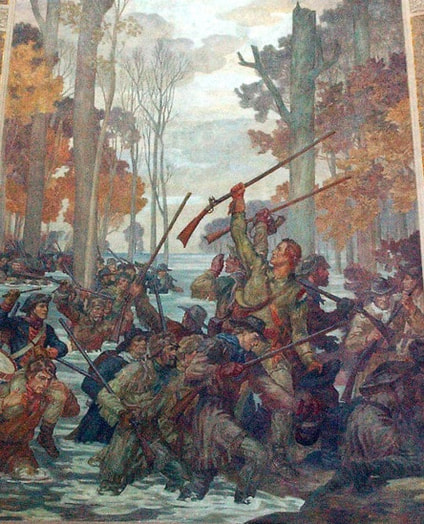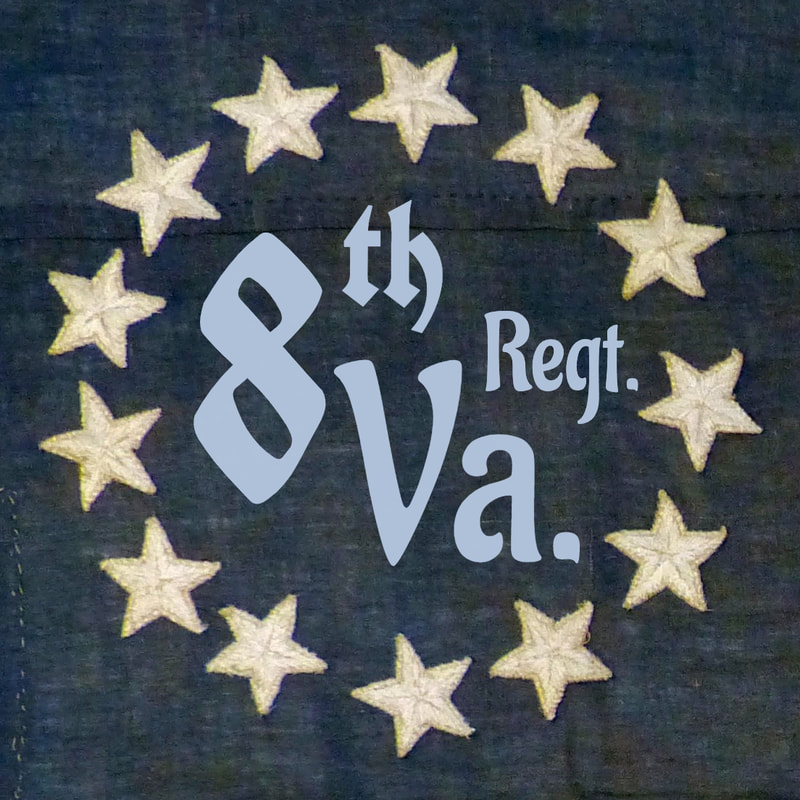 George Rogers Clark leading troops on the frontier. (National Park Service) George Rogers Clark leading troops on the frontier. (National Park Service) In 1781, the traitor Benedict Arnold was sent to Virginia by the British to disrupt American supply lines supporting patriots farther south. Opposing him was Brig. Gen. Peter Muhlenberg, the 8th Virginia’s original colonel. Gov. Thomas Jefferson gave Muhlenberg instructions to capture Arnold and specified that the plan should be carried out by “men from the western side of the mountains.” As a former pastor from Woodstock and colonel of the 8th Virginia, Muhlenberg knew many such men. Jefferson wrote: You will readily suppose that it is above all things desireable to drag him from those under whose wing he is now sheltered. ... Having peculiar confidence in the men from the Western side of the mountains, I meant as soon as they should come down to get the enterprize proposed to a chosen number of them, such whose courage and whose fidelity would be above all doubt. Your perfect knowlege of those men personally, and my confidence in your discretion, induce me to ask you to pick from among them proper characters, in such number as you think best, to reveal to them our desire, and engage them [to] undertake to seize and bring off this greatest of all traitors. Whether this may be best effected by their going in as friends and awaiting their opportunity, or otherwise is left to themselves. The smaller the number the better; so that they be sufficient to manage him. Every necessary caution must be used on their part to prevent a discovery of their design by the enemy, as should they be taken, the laws of war will justify against them the most rigorous sentence. I will undertake if they are succesful in bringing him off alive, that they shall receive five thousand guineas reward among them, and to men formed for such an enterprize it must be a great incitement to know that their names will be recorded with glory in history.... Arnold wasn’t captured. His security was too tight. Some histories, however, report rumors of a failed attempt. Edward Hocker’s 1936 biography of Muhlenberg, for example, documents a “tradition” that Col. George Rogers Clark (who had two brothers in the 8th Virginia) was tapped to lead the mission. Clark was newly famous for his successful campaign against the British in Illinois and his capture of Gov. Henry Hamilton, the coordinator of Indian attacks on the frontier. According to Hocker’s narrative, one of Clark’s men was captured and taken before Arnold, who asked him, “What would be my fate if the Americans caught me?” The prisoner replied, “We would cut off that shortened leg wounded at Quebec and Saratoga and bury it with the honors of war, and then hang the rest of you.” Ironically, it was George Rogers Clark who ultimately had his leg cut off. Many years later, after a having a stroke and in a drunken stupor, he fell into a fireplace and severely burned himself. When gangrene set in, he was told a leg would have to be amputated. On the day of the procedure, he arranged to have fifers and drummers from the local militia come and play martial tunes to celebrate. He reportedly tapped his fingers in time with the music as they sawed off his leg, “effected more by the music than the pain.” Updated August 24, 2019
2 Comments
Dr. Ken Carstens
2/3/2020 09:02:56 am
There is NO evidence that the cause of Clark's right leg amputation was the result of his being in a drunken stupor, falling, and burning his leg. There is MORE evidence that General Clark might have had a STROKE, and fallen, and burned his leg, thus causing his leg to have to be amputated. There are several instances of Clark having heart and stroke-related problems. Don't be so quick to jump on the Clark-hating band wagon that accusing Clark of being a drunken sot. Little to no evidence supports that position. You were not there.
Reply
2/4/2020 12:00:13 am
No Clark-hating going on here. Many veterans, including generals, struggled with alcoholism. I don’t recall the source on his being drunk and will consider an edit. The post does mention the stroke.
Reply
Leave a Reply. |
Gabriel Nevilleis researching the history of the Revolutionary War's 8th Virginia Regiment. Its ten companies formed near the frontier, from the Cumberland Gap to Pittsburgh. Categories
All
Archives
June 2024
© 2015-2022 Gabriel Neville
|

 RSS Feed
RSS Feed